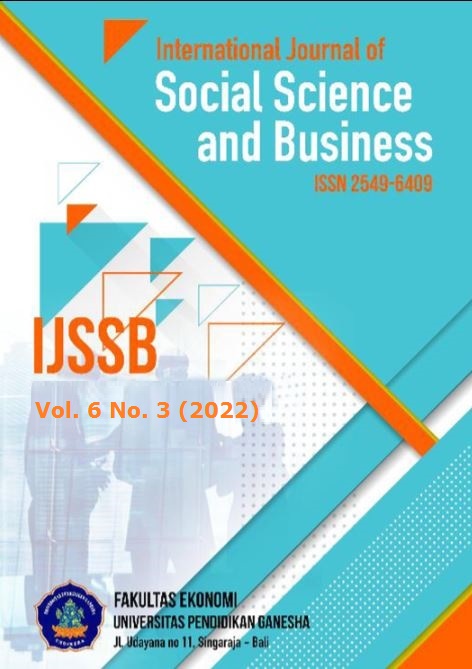The Effect of Financial Literature and Financial Technology on Financial Inclusion Among Accounting Student
DOI:
https://doi.org/10.23887/ijssb.v6i3.40508Keywords:
Financial Literacy, Financial Technology, Financial Inclusion, Students.Abstract
Improvements in financial literacy serve as the primary driver of financial inclusion. To avoid financial difficulties, everyone should be financially literate. Having better financial literacy increases one's chances of enjoying life's pleasures while also being well-funded. This study aims to analyze the effect of financial literacy and financial technology on financial inclusion. The population in this study consisted of 180 accounting students. This study was a causal comparative research, and the data collection method used was a cross-sectional survey with proportional stratified random sampling. The Krejcie and Morgan table was used to determine the research sample of up to 123 students. According to the findings, financial literacy has a positive and significant impact on financial inclusion. Furthermore, financial technology has a significant and positive impact on financial inclusion. And, simultaneously, financial literacy and financial technology have a positive and significant impact on financial inclusion. If financial literacy and financial technology are increasing factors, it is recommended that the government consider these aspects if you want to increase financial inclusion among students. Other variables from financial inclusion instruments can be added for further research by collecting samples from several universities in various regions.
References
Adiyanto, M. R., & Purnomo, A. S. D. (2021). Dampak tingkat literasi keuangan syariah terhadap minat menggunakan produk keuangan syariah. Jurnal Administrasi Kantor, 9(1), 1–12. https://doi.org/10.51211/jak.v9i1.1461. DOI: https://doi.org/10.26740/jpak.v9n1.p1-12
Akileng, G., Lawino, G. M., & Nzibonera, E. (2018). Evaluation of determinants of financial inclusion in Uganda. Journal of Applied Finance & Banking, 8(4), 1792–6599. http://www.scienpress.com/Upload/JAFB/Vol%208_4_4.pdf.
Anshari, M., Almunawar, M. N., & Masri, M. (2020). Financial technology and disruptive innovation in business: concept and application. International Journal of Asian Business and Information Management (IJABIM), 11(4), 29–43. https://doi.org/10.4018/IJABIM.2020100103. DOI: https://doi.org/10.4018/IJABIM.2020100103
Asuming, P. O., Osei-Agyei, L. G., & Mohammed, J. I. (2019). Financial inclusion in sub-Saharan Africa: Recent trends and determinants. Journal of African Business, 20(1), 112–134. https://doi.org/10.1080/15228916.2018.1484209. DOI: https://doi.org/10.1080/15228916.2018.1484209
Creswell, J. W. (2012). Educational Research. University of Nebraska.
Damayanti, S. M., & Zakarias, R. (2020). Generasi Milenial sebagai Pengguna Fintech: Dampaknya terhadap Literasi dan Inklusi Keuangan di Indonesia. Ekonomi Dan Bisnis, 7(2), 105. https://doi.org/10.35590/jeb.v7i2.2193. DOI: https://doi.org/10.35590/jeb.v7i2.2193
Dewi, V. I., Febrian, E., Effendi, N., Anwar, M., & Nidar, S. R. (2020). Financial literacy and its variables: The evidence from Indonesia. Economics & Sociology, 13(3), 133–154. https://doi.org/10.14254/2071-789X.2020/13-3/9. DOI: https://doi.org/10.14254/2071-789X.2020/13-3/9
Gautam, R. S., Rastogi, S., Rawal, A., Bhimavarapu, V. M., Kanoujiya, J., & Rastogi, S. (2022). Financial Technology and Its Impact on Digital Literacy in India: Using Poverty as a Moderating Variable. Journal of Risk and Financial Management, 15(7), 311–321. https://doi.org/10.3390/jrfm15070311. DOI: https://doi.org/10.3390/jrfm15070311
Goyal, K., & Kumar, S. (2021). Financial literacy: A systematic review and bibliometric analysis. International Journal of Consumer Studies, 45(1), 80–105. https://doi.org/10.1111/ijcs.12605. DOI: https://doi.org/10.1111/ijcs.12605
Lasmini, R. S., & Zulvia, Y. (2021). Inklusi Keuangan dan Pengaruhnya terhadap Penggunaan Financial Technology Pada Generasi Milenial. Jurnal Inovasi Pendidikan Ekonomi (JIPE), 11(1), 45. https://doi.org/https://doi.org/10.24036/011122790. DOI: https://doi.org/10.24036/011122790
Lestari, N. M. (2019). Pengaruh Tingkat Literasi Mahasiswa Perbankan Syariah Terhadap Inklusi Keuangan Produk Perbankan Syariah Dalam Transaksi E-Commerce. Jurnal Ekonomi Islam Fakultas Agama Islam UHAMKA, 10(2), 208–226. https://garuda.kemdikbud.go.id/documents/detail/1482678.
Lubis, A., Dalimunthe, R., & Situmeang, C. (2019). Antecedents Effect of Financial Inclusion for the People of North Sumatera. Budapest International Research and Critics Institute (BIRCI-Journal) : Humanities and Social Sciences, 2(4), 401–408. https://doi.org/10.33258/birci.v2i4.602. DOI: https://doi.org/10.33258/birci.v2i4.602
Marginingsih, R. (2021). Financial Technology (Fintech) Dalam Inklusi Keuangan Nasional di Masa Pandemi Covid-19. Moneter - Jurnal Akuntansi Dan Keuangan, 8(1), 56–64. https://doi.org/10.31294/moneter.v8i1.9903. DOI: https://doi.org/10.31294/moneter.v8i1.9903
Miswan, A. (2019). Perkembangan dan Dampak Financial Technology (Fintech) terhadap Industri Keuangan Syariah di Jawa Tengah. Wahana Islamika: Jurnal Studi Keislaman, 5(1), 38. https://doi.org/10.5281/wahanaislamika.v5i1.41.
Muzdalifa, I., Rahma, I. A., & Novalia, B. G. (2018). Peran Fintech Dalam Meningkatkan Keuangan Inklusif Pada UMKM Di Indonesia (Pendekatan Keuangan Syariah). Jurnal Masharif Al-Syariah: Jurnal Ekonomi Dan Perbankan Syariah, 3(1). https://doi.org/10.30651/jms.v3i1.1618. DOI: https://doi.org/10.30651/jms.v3i1.1618
Nurohman, Y. A., Kusuma, M., & Narulitasari, D. (2021). Fin-Tech, Financial Inclusion, and Sustainability: a Quantitative Approach of Muslims SMEs. International Journal of Islamic Business Ethics, 6(1), 54. https://doi.org/10.30659/ijibe.6.1.54-67. DOI: https://doi.org/10.30659/ijibe.6.1.54-67
Prasad, H., Meghwal, D., & Dayama, V. (2018). Digital Financial Literacy : A Study of Households of Udaipur. The Journal of Business and Management, V(I), 23–32. https://doi.org/10.3126/jbm.v5i0.27385. DOI: https://doi.org/10.3126/jbm.v5i0.27385
Rahayu, P. N., & Putra, N. W. A. (2019). Pengaruh Motivasi, Penghargaan Finansial, Pelatihan Profesional, Pertimbangan Pasar Kerja, Lingkungan Pada Karir Akuntan Publik. E-Jurnal Akuntansi, 28(2), 1200. https://doi.org/10.24843/eja.2019.v28.i02.p16. DOI: https://doi.org/10.24843/EJA.2019.v28.i02.p16
Sangwan, V., Prakash, P., & Singh, S. (2019). Financial technology: a review of extant literature. Studies in Economics and Finance, 37(1), 71–88. https://doi.org/10.1108/SEF-07-2019-0270. DOI: https://doi.org/10.1108/SEF-07-2019-0270
Sari, P. B., & Dwilita, H. (2018). Prospek Financial Technology (Fintech) Di Sumatera Utara Dilihat Dari Sisi Literasi Keuangan, Inklusi Keuangan Dan Kemiskinan. Kajian Akuntansi, 19(1), 09–18. http://ejournal.unisba.ac.id/index.php/kajian_akuntansi/article/view/3507.
Septiani, R. N., & Wuryani, E. (2020). Pengaruh Literasi Keuangan Dan Inklusi Keuangan Terhadap Kinerja Umkm Di Sidoarjo. E-Jurnal Manajemen Universitas Udayana, 9(8), 3214. https://doi.org/10.24843/ejmunud.2020.v09.i08.p16. DOI: https://doi.org/10.24843/EJMUNUD.2020.v09.i08.p16
Sholeh, B. (2019). Pengaruh Literasi Keuangan Terhadap Perilaku Keuangan Mahasiswa Program Studi Pendidikan Ekonomi Universitas Pamulang. Pekobis : Jurnal Pendidikan, Ekonomi, Dan Bisnis, 4(2), 57. https://doi.org/10.32493/pekobis.v4i2.p57-67.4306. DOI: https://doi.org/10.32493/pekobis.v4i2.P57-67.4306
Sohilauw, M. I. (2018). Moderasi Inklusi Keuangan Terhadap Hubungan LiterasiKeuangan dan Keputusan Struktur Modal UKM. Jbima (Jurnal Bisnis Dan Manajemen), 6(2), 92–114. http://journal.peradaban.ac.id/index.php/jbm/article/view/295.
Sugiyono. (2017). Metode Penelitian Kuantitatif, Kualitatif, dan R & D. CV Alfabeta.
Wisnu, A. A. N., & Dharmawan, N. K. S. (2022). Legalitas Investasi Aset Kripto di Indonesia Sebagai Komoditas Digital dan Alat Pembayaran. Kertha Wicara: Journal Ilmu Hukum, 11(1), 66–80. https://ojs.unud.ac.id/index.php/kerthawicara/article/view/79336/43327.
Yuking, A. S. (2018). Urgensi peraturan perlindungan data pribadi dalam era bisnis fintech. Jurnal Hukum & Pasar Modal, VII, 1–27. https://doi.org/10.22225/jhp.7.1.1324.27-33. DOI: https://doi.org/10.22225/jhp.7.1.1324.27-33
Yushita, A. N. (2017). Pentingnya Literasi Keuangan Bagi Pengelolaan Keuangan Pribadi. Nominal, Barometer Riset Akuntansi Dan Manajemen, 6(1). https://doi.org/10.21831/nominal.v6i1.14330. DOI: https://doi.org/10.21831/nominal.v6i1.14330
Downloads
Published
How to Cite
Issue
Section
License
Copyright (c) 2022 Dhany Efita Sari, Erlin Ade Selviana, Brilliani, Nadia Fauzi Asila, Miftakhul Jannah

This work is licensed under a Creative Commons Attribution-ShareAlike 4.0 International License.











